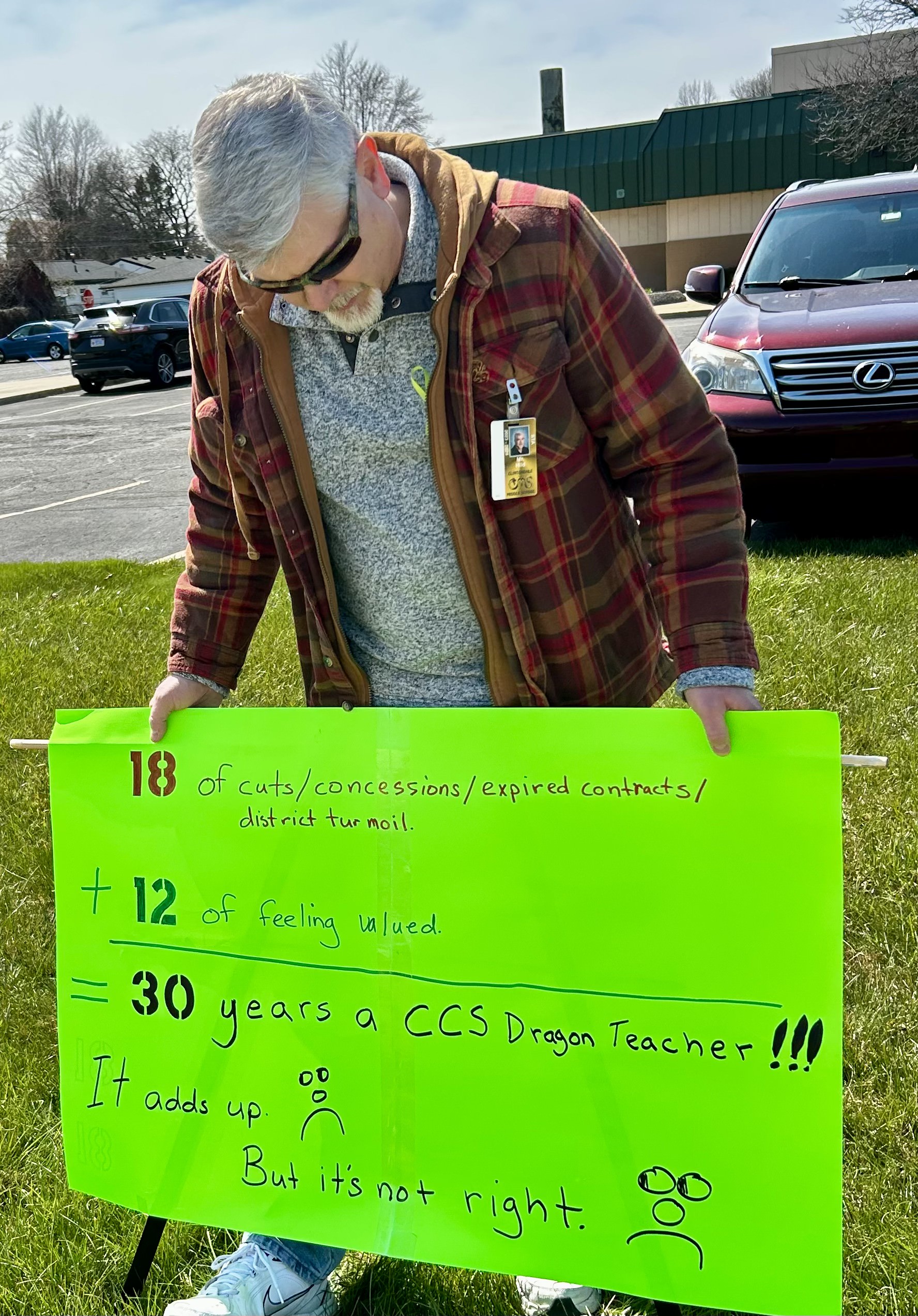GOP budget cuts $1.4 billion from schools
By Brenda Ortega
MEA Voice Editor
 A deep dive into the state budget passed by Michigan House Republicans shows their aim is to cut $1.4 billion from schools and $1.6 billion from other state programs to boost spending on roads by $3 billion next year.
A deep dive into the state budget passed by Michigan House Republicans shows their aim is to cut $1.4 billion from schools and $1.6 billion from other state programs to boost spending on roads by $3 billion next year.
The new analysis by MEA Labor Economist Tanner Delpier lays out mechanisms used to divert funds in the GOP spending plan, which House Speaker Matt Hall (R-Richland) rushed to pass in large part last week. The House education budget was similarly passed in June.
“The changes to accomplish these ends are spread across at least 11 bills, including both budgetary and statutory changes,” Delpier said. “While the policy mechanisms are complicated, the result is not: The plan is to raid schools to pay for roads.”
In stark contrast, last May Senate Democrats passed an education budget that bolsters schools — already facing an end to federal COVID-relief dollars — with an additional $1 billion to continue improving teacher salaries, student mental health, school infrastructure, and literacy initiatives.
 Senate Majority Leader Winnie Brinks (D-Grand Rapids) has said for weeks that Democrats would not negotiate over new spending on roads until Republican House leaders showed their math — how they would pay for it.
Senate Majority Leader Winnie Brinks (D-Grand Rapids) has said for weeks that Democrats would not negotiate over new spending on roads until Republican House leaders showed their math — how they would pay for it.
The answer came in the omnibus budget that Hall passed on Aug. 26 one hour after unveiling it. According to Delpier, who holds a PhD in education policy, “The House budget … conveys more than just a different set of values; it is irresponsible policy.”
House Republicans have falsely claimed their education budget lifts overall education spending because it raises the per-pupil amount. However, their plan guts other school funding in a cruel shell game that makes students the ultimate losers.
“Fundamentally, the House education budget is structured to undermine the long-term viability of public education in Michigan,” Delpier said in his analysis.
Seeing the broad swath of cuts to public services proposed in Hall’s road funding plan, Brinks issued a statement Tuesday saying, “I keep hearing that Speaker Matt Hall is calling me the problem… I pledge to the people of Michigan that I will be a ‘problem’ until Republicans start putting them first.”
Recent polling has shown overwhelming public sentiment favoring increased support for schools in Michigan, prioritizing public education over road construction, and specifically in support of higher pay for educators.
Meanwhile, the budget stalemate is playing out against a worrisome backdrop in many places where teachers started a new school year without a settled contract, including Northville, Utica, Birmingham, Grand Rapids, Kalamazoo, Ludington, Walled Lake, Waterford, Howell, Brighton, Ortonville, Farwell, Holly, Milan and more.
In at least two school districts — Pontiac and Clintondale — teachers marked the start of a second school year under an expired contract even as a number of local unions across the state cemented strong deals to better attract and retain educators.
In Clintondale, 75 of 115 professional staff resigned or retired from the district in the past two years. It’s impossible to calculate the loss of experience and training when veteran teachers must leave to find respect they deserve, said Mike Ward, president of the Clintondale Education Association (CEA).
“Educators are the greatest strength of this district, and they continue to work hard every day on behalf of students despite this administration’s failure in its fundamental duty,” Ward said. “Instead of being prioritized, our teachers and other school professionals feel undervalued and demoralized.”
In Pontiac, teachers continue their fight for a fair contract into a second school year while also pushing back against a district restructuring plan developed unilaterally without the benefit of staff expertise or insight, said Pontiac Education Association (PEA) President Candice Ridley.
“This plan will chase away families and put our district in jeopardy of closing for good,” Ridley said. “Pontiac schools have amazing teachers, support staff, students, and programs. Let’s invest in what we know to work: a fair payscale for teachers and all school workers and small class sizes.”
The PEA, working closely with the Pontiac Paraeducators Association, is urging parents and school employees to show up and speak out at the school board meeting on Monday, Sept. 8.
 Educators in Grand Rapids Public Schools (GRPS) also are pushing for a big turnout at a school board meeting next Monday as they turn up pressure for a fair contract. The eighth largest district in the state serving more than 13,000 students, GRPS spends fewer resources on instruction than 91% of districts.
Educators in Grand Rapids Public Schools (GRPS) also are pushing for a big turnout at a school board meeting next Monday as they turn up pressure for a fair contract. The eighth largest district in the state serving more than 13,000 students, GRPS spends fewer resources on instruction than 91% of districts.
GRPS teachers are lowest paid in Kent County and consequently have the worst five-year retention rate among similar districts in the state. “Our kids deserve stable, experienced educators,” said MEA UniServ Director Heather Palo. “It’s time for change, and together we can make it happen.”
On a larger scale, the same need exists for parents, educators and community advocates to turn up the volume on demands for a reasonable state budget to fund schools going forward. As the Oct. 1 fiscal-year deadline approaches, so does the risk of a government shutdown.
In a memo released this week, State Superintendent Michael Rice urged school administrators to rally communities to pressure lawmakers for a reasonable education budget. The House plan is “an outlier budget which would significantly disrupt services to children,” the memo said.
“Help us help legislators understand the problem for children of further delays in enacting a reasonable budget for students, staff, and schools — one that provides the funding of a sufficient foundation allowance, children’s mental health and school safety, school meals, school transportation, students with disabilities, economically disadvantaged students, efforts to rectify the teacher shortage, and many other important aspects of the state school aid act.”



